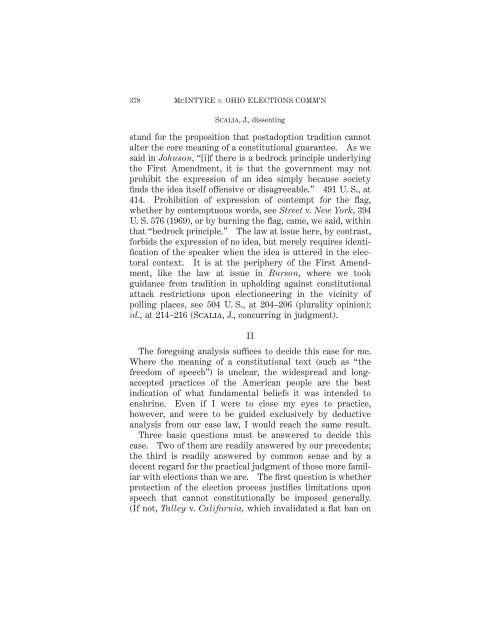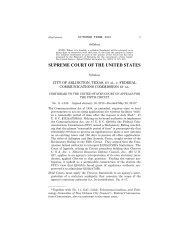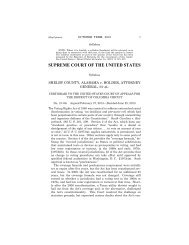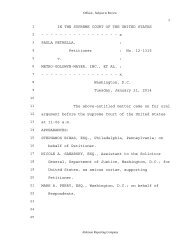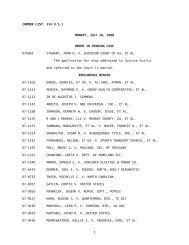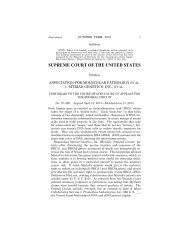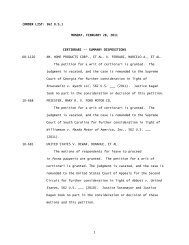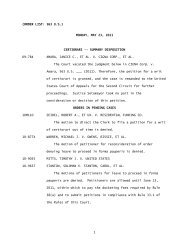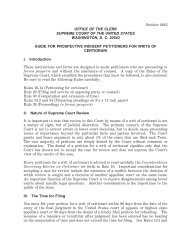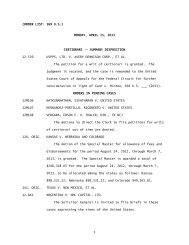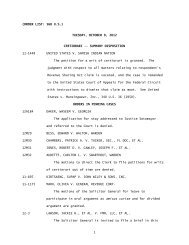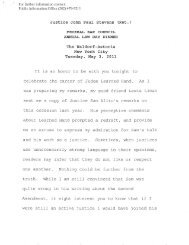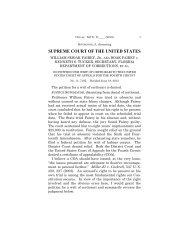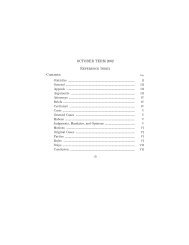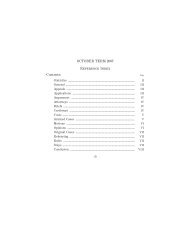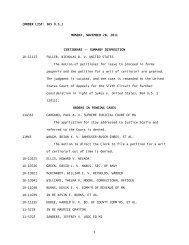- Page 1 and 2:
514BV$spin 07-09-98 11:19:31 UNITED
- Page 3 and 4:
514bv$$iii 04-23-98 19:41:16 PGT
- Page 5 and 6:
Job: 514BV$ Unit: $$U5 [09-12-99 19
- Page 7 and 8:
Job: 514BV$ Unit: $$U5 [09-12-99 16
- Page 9 and 10:
Job: 514BV$ Unit: $$U5 [09-12-99 16
- Page 11 and 12:
Job: 514BV$ Unit: $$U5 [09-12-99 16
- Page 13 and 14:
Job: 514BV$ Unit: $$U5 [09-12-99 16
- Page 15 and 16:
Job: 514BV$ Unit: $$U5 [09-12-99 16
- Page 17 and 18:
Job: 514BV$ Unit: $$U5 [09-12-99 16
- Page 19 and 20:
Job: 514BV$ Unit: $$U5 [09-12-99 16
- Page 21 and 22:
Job: 514BV$ Unit: $$U5 [09-12-99 16
- Page 23 and 24:
Job: 514BV$ Unit: $$U5 [09-12-99 16
- Page 25 and 26:
Job: 514BV$ Unit: $$U5 [09-12-99 16
- Page 27 and 28:
Job: 514BV$ Unit: $$U5 [09-12-99 16
- Page 29 and 30:
Job: 514BV$ Unit: $$U5 [09-12-99 16
- Page 31 and 32:
Job: 514BV$ Unit: $$U5 [09-12-99 16
- Page 33 and 34:
Job: 514BV$ Unit: $$U5 [09-12-99 16
- Page 35 and 36:
Job: 514BV$ Unit: $$U5 [09-12-99 16
- Page 37 and 38:
Job: 514BV$ Unit: $$U5 [09-12-99 16
- Page 39 and 40:
Job: 514BV$ Unit: $$U5 [09-12-99 16
- Page 41 and 42:
Job: 514BV$ Unit: $$U5 [09-12-99 16
- Page 43 and 44:
Job: 514BV$ Unit: $$U5 [09-12-99 16
- Page 45 and 46:
Job: 514BV$ Unit: $$U5 [09-12-99 16
- Page 47 and 48:
Job: 514BV$ Unit: $$U5 [09-12-99 16
- Page 49 and 50:
Job: 514BV$ Unit: $$U5 [09-12-99 16
- Page 51 and 52:
Job: 514BV$ Unit: $$U5 [09-12-99 16
- Page 53 and 54:
Job: 514BV$ Unit: $$U5 [09-12-99 16
- Page 55 and 56:
Job: 514BV$ Unit: $$U5 [09-12-99 16
- Page 57 and 58:
Job: 514BV$ Unit: $$U5 [09-12-99 16
- Page 59 and 60:
Job: 514BV$ Unit: $$U5 [09-12-99 16
- Page 61 and 62:
Job: 514BV$ Unit: $$U5 [09-12-99 16
- Page 63 and 64:
Job: 514BV$ Unit: $$U5 [09-12-99 16
- Page 65 and 66:
Job: 514BV$ Unit: $$U5 [09-12-99 16
- Page 67 and 68:
Job: 514BV$ Unit: $$U5 [09-12-99 16
- Page 69 and 70:
Job: 514BV$ Unit: $$U5 [09-12-99 16
- Page 71 and 72:
Job: 514BV$ Unit: $$U5 [09-12-99 16
- Page 73 and 74:
514us1$30Z 06-11-98 18:12:58 PAGES
- Page 75 and 76:
514us1$30H 06-11-98 18:12:58 PAGES
- Page 77 and 78:
514us1$30H 06-11-98 18:12:58 PAGES
- Page 79 and 80:
514us1$30H 06-11-98 18:12:58 PAGES
- Page 81 and 82:
514us1$30H 06-11-98 18:12:58 PAGES
- Page 83 and 84:
514us1$30H 06-11-98 18:12:59 PAGES
- Page 85 and 86:
514us1$30H 06-11-98 18:12:59 PAGES
- Page 87 and 88:
514us1$30H 06-11-98 18:12:59 PAGES
- Page 89 and 90:
514us1$30J 06-11-98 18:12:59 PAGES
- Page 91 and 92:
514us1$30I 06-11-98 18:12:59 PAGES
- Page 93 and 94:
514us1$30I 06-11-98 18:12:59 PAGES
- Page 95 and 96:
514us1$30P 06-11-98 18:12:59 PAGES
- Page 97 and 98:
514us1$30P 06-11-98 18:12:59 PAGES
- Page 99 and 100:
514us1$30P 06-11-98 18:12:59 PAGES
- Page 101 and 102:
514us1$30P 06-11-98 18:12:59 PAGES
- Page 103 and 104:
514us1$30P 06-11-98 18:12:59 PAGES
- Page 105 and 106:
514us1$30P 06-11-98 18:12:59 PAGES
- Page 107 and 108:
514us1$31Z 05-29-98 14:50:44 PAGES
- Page 109 and 110:
514us1$31P 05-29-98 14:50:44 PAGES
- Page 111 and 112:
514us1$31P 05-29-98 14:50:45 PAGES
- Page 113 and 114:
514us1$31P 05-29-98 14:50:45 PAGES
- Page 115 and 116:
514us1$31P 05-29-98 14:50:45 PAGES
- Page 117 and 118:
514us1$31P 05-29-98 14:50:45 PAGES
- Page 119 and 120:
514us1$31P 05-29-98 14:50:45 PAGES
- Page 121 and 122:
514us1$31P 05-29-98 14:50:45 PAGES
- Page 123 and 124:
514us1$32z 06-11-98 18:14:25 PAGES
- Page 125 and 126:
514us1$32I 06-11-98 18:14:25 PAGES
- Page 127 and 128:
514us1$32I 06-11-98 18:14:25 PAGES
- Page 129 and 130:
514us1$32I 06-11-98 18:14:25 PAGES
- Page 131 and 132:
514us1$32I 06-11-98 18:14:25 PAGES
- Page 133 and 134:
514us1$32I 06-11-98 18:14:25 PAGES
- Page 135 and 136:
514us1$32I 06-11-98 18:14:25 PAGES
- Page 137 and 138:
514us1$32N 06-11-98 18:14:25 PAGES
- Page 139 and 140:
514us1$32N 06-11-98 18:14:25 PAGES
- Page 141 and 142:
514us1$32N 06-11-98 18:14:26 PAGES
- Page 143 and 144:
514us1$32N 06-11-98 18:14:26 PAGES
- Page 145 and 146:
514us1$33z 05-29-98 14:51:51 PAGES
- Page 147 and 148:
514us1$33J 05-29-98 14:51:51 PAGES
- Page 149 and 150:
514us1$33J 05-29-98 14:51:51 PAGES
- Page 151 and 152:
514us1$33J 05-29-98 14:51:51 PAGES
- Page 153 and 154:
514us1$33J 05-29-98 14:51:51 PAGES
- Page 155 and 156:
514us1$33J 05-29-98 14:51:51 PAGES
- Page 157 and 158:
514us1$33J 05-29-98 14:51:51 PAGES
- Page 159 and 160:
514us1$34z 05-27-98 14:27:39 PAGES
- Page 161 and 162:
514us1$34L 05-27-98 14:27:39 PAGES
- Page 163 and 164:
514us1$34L 05-27-98 14:27:39 PAGES
- Page 165 and 166:
514us1$34L 05-27-98 14:27:39 PAGES
- Page 167 and 168:
514us1$34L 05-27-98 14:27:39 PAGES
- Page 169 and 170:
514us1$34L 05-27-98 14:27:40 PAGES
- Page 171 and 172:
514us1$34L 05-27-98 14:27:40 PAGES
- Page 173 and 174:
514us1$34L 05-27-98 14:27:40 PAGES
- Page 175 and 176:
514us1$34J 05-27-98 14:27:40 PAGES
- Page 177 and 178:
514us1$34J 05-27-98 14:27:40 PAGES
- Page 179 and 180:
514us1$34J 05-27-98 14:27:40 PAGES
- Page 181 and 182:
514us1$34J 05-27-98 14:27:40 PAGES
- Page 183 and 184:
514us1$34J 05-27-98 14:27:40 PAGES
- Page 185 and 186:
514us1$34J 05-27-98 14:27:40 PAGES
- Page 187 and 188:
514US1$35z 02-06-97 10:31:42 PAGES
- Page 189 and 190:
514US1$35z 02-06-97 10:31:42 PAGES
- Page 191 and 192:
514US1$35z 02-06-97 10:31:42 PAGES
- Page 193 and 194:
514us1$36z 05-27-98 14:36:58 PAGES
- Page 195 and 196:
514us1$36K 05-27-98 14:36:59 PAGES
- Page 197 and 198:
514us1$36K 05-27-98 14:36:59 PAGES
- Page 199 and 200:
514us1$36K 05-27-98 14:36:59 PAGES
- Page 201 and 202:
514us1$36K 05-27-98 14:36:59 PAGES
- Page 203 and 204:
514us1$36K 05-27-98 14:36:59 PAGES
- Page 205 and 206:
514us1$36K 05-27-98 14:36:59 PAGES
- Page 207 and 208:
514us1$36K 05-27-98 14:36:59 PAGES
- Page 209 and 210:
514us1$36p 05-27-98 14:36:59 PAGES
- Page 211 and 212:
514us1$36p 05-27-98 14:36:59 PAGES
- Page 213 and 214:
514us1$36p 05-27-98 14:36:59 PAGES
- Page 215 and 216:
514us1$37z 06-11-98 18:24:41 PAGES
- Page 217 and 218:
514us1$37N 06-11-98 18:24:41 PAGES
- Page 219 and 220:
514us1$37N 06-11-98 18:24:41 PAGES
- Page 221 and 222:
514us1$37N 06-11-98 18:24:41 PAGES
- Page 223 and 224:
514us1$37N 06-11-98 18:24:41 PAGES
- Page 225 and 226:
514us1$37N 06-11-98 18:24:41 PAGES
- Page 227 and 228:
514us1$37N 06-11-98 18:24:41 PAGES
- Page 229 and 230:
514us1$37N 06-11-98 18:24:41 PAGES
- Page 231 and 232:
514us1$38Z 05-27-98 14:52:04 PAGES
- Page 233 and 234:
514us1$38Q 05-27-98 14:52:04 PAGES
- Page 235 and 236:
514us1$38Q 05-27-98 14:52:04 PAGES
- Page 237 and 238:
514us1$38Q 05-27-98 14:52:04 PAGES
- Page 239 and 240:
514us1$38Q 05-27-98 14:52:04 PAGES
- Page 241 and 242:
514us1$38Q 05-27-98 14:52:04 PAGES
- Page 243 and 244:
514us1$38Q 05-27-98 14:52:04 PAGES
- Page 245 and 246:
514us1$38Q 05-27-98 14:52:04 PAGES
- Page 247 and 248:
514us1$39Z 06-11-98 18:17:15 PAGES
- Page 249 and 250:
514us1$39M 06-11-98 18:17:15 PAGES
- Page 251 and 252:
514us1$39M 06-11-98 18:17:15 PAGES
- Page 253 and 254:
514us1$39M 06-11-98 18:17:15 PAGES
- Page 255 and 256:
514us1$39M 06-11-98 18:17:15 PAGES
- Page 257 and 258:
514us1$39M 06-11-98 18:17:15 PAGES
- Page 259 and 260:
514us1$39M 06-11-98 18:17:15 PAGES
- Page 261 and 262:
514us1$39M 06-11-98 18:17:15 PAGES
- Page 263 and 264:
514us1$39M 06-11-98 18:17:16 PAGES
- Page 265 and 266:
514us1$39M 06-11-98 18:17:16 PAGES
- Page 267 and 268:
514us1$39M 06-11-98 18:17:16 PAGES
- Page 269 and 270:
514us1$39M 06-11-98 18:17:16 PAGES
- Page 271 and 272:
514us1$39M 06-11-98 18:17:16 PAGES
- Page 273 and 274:
514us1$39Q 06-11-98 18:17:16 PAGES
- Page 275 and 276:
514us1$39Q 06-11-98 18:17:16 PAGES
- Page 277 and 278:
514us1$39Q 06-11-98 18:17:16 PAGES
- Page 279 and 280:
514us1$40Z 06-11-98 18:18:52 PAGES
- Page 281 and 282:
514us1$40H 06-11-98 18:18:53 PAGES
- Page 283 and 284:
514us1$41z 05-27-98 15:19:40 PAGES
- Page 285 and 286:
514us1$41k 05-27-98 15:19:40 PAGES
- Page 287 and 288:
514us1$41k 05-27-98 15:19:40 PAGES
- Page 289 and 290:
514us1$41k 05-27-98 15:19:40 PAGES
- Page 291 and 292:
514us1$41k 05-27-98 15:19:40 PAGES
- Page 293 and 294:
514us1$41k 05-27-98 15:19:40 PAGES
- Page 295 and 296:
514us1$41k 05-27-98 15:19:40 PAGES
- Page 297 and 298:
514us1$41k 05-27-98 15:19:40 PAGES
- Page 299 and 300:
514us1$41k 05-27-98 15:19:40 PAGES
- Page 301 and 302:
514us1$41k 05-27-98 15:19:40 PAGES
- Page 303 and 304:
514us1$41k 05-27-98 15:19:40 PAGES
- Page 305 and 306:
514us1$41k 05-27-98 15:19:40 PAGES
- Page 307 and 308:
514us1$41k 05-27-98 15:19:40 PAGES
- Page 309 and 310:
514us1$41k 05-27-98 15:19:40 PAGES
- Page 311 and 312:
514us1$41k 05-27-98 15:19:40 PAGES
- Page 313 and 314:
514us1$41q 05-27-98 15:19:40 PAGES
- Page 315 and 316:
514us1$41q 05-27-98 15:19:40 PAGES
- Page 317 and 318:
514us1$41q 05-27-98 15:19:40 PAGES
- Page 319 and 320:
514us1$41i 05-27-98 15:19:40 PAGES
- Page 321 and 322:
514us1$41i 05-27-98 15:19:41 PAGES
- Page 323 and 324:
514us1$41i 05-27-98 15:19:41 PAGES
- Page 325 and 326:
514us1$41i 05-27-98 15:19:41 PAGES
- Page 327 and 328:
514us1$41i 05-27-98 15:19:41 PAGES
- Page 329 and 330:
514us1$41i 05-27-98 15:19:41 PAGES
- Page 331 and 332:
514us1$41i 05-27-98 15:19:41 PAGES
- Page 333 and 334:
514us1$41i 05-27-98 15:19:41 PAGES
- Page 335 and 336:
514us1$41i 05-27-98 15:19:41 PAGES
- Page 337 and 338:
514us1$41i 05-27-98 15:19:41 PAGES
- Page 339 and 340:
514us1$42Z 05-29-98 14:52:58 PAGES
- Page 341 and 342:
514us1$42M 05-29-98 14:52:58 PAGES
- Page 343 and 344:
514us1$42M 05-29-98 14:52:58 PAGES
- Page 345 and 346:
514us1$42M 05-29-98 14:52:58 PAGES
- Page 347 and 348:
514us1$42M 05-29-98 14:52:58 PAGES
- Page 349 and 350:
514us1$42J 05-29-98 14:52:58 PAGES
- Page 351 and 352:
514us1$43z 06-11-98 18:20:01 PAGES
- Page 353 and 354:
514us1$43n 06-11-98 18:20:01 PAGES
- Page 355 and 356:
514us1$43n 06-11-98 18:20:01 PAGES
- Page 357 and 358:
514us1$43n 06-11-98 18:20:01 PAGES
- Page 359 and 360:
514us1$43n 06-11-98 18:20:01 PAGES
- Page 361 and 362:
514us1$43n 06-11-98 18:20:01 PAGES
- Page 363 and 364:
514us1$44z 05-27-98 15:30:01 PAGES
- Page 365 and 366:
514us1$44q 05-27-98 15:30:01 PAGES
- Page 367 and 368:
514us1$44q 05-27-98 15:30:01 PAGES
- Page 369 and 370:
514us1$44q 05-27-98 15:30:01 PAGES
- Page 371 and 372:
514us2$45z 05-27-98 16:00:19 PAGES
- Page 373 and 374:
514us2$45h 05-27-98 16:00:19 PAGES
- Page 375 and 376:
514us2$45h 05-27-98 16:00:19 PAGES
- Page 377 and 378:
514us2$45h 05-27-98 16:00:19 PAGES
- Page 379 and 380:
514us2$45h 05-27-98 16:00:20 PAGES
- Page 381 and 382:
514us2$45h 05-27-98 16:00:20 PAGES
- Page 383 and 384:
514us2$45h 05-27-98 16:00:20 PAGES
- Page 385 and 386:
514us2$45i 05-27-98 16:00:20 PAGES
- Page 387 and 388:
514us2$45i 05-27-98 16:00:20 PAGES
- Page 389 and 390:
514us2$45i 05-27-98 16:00:20 PAGES
- Page 391 and 392:
514us2$45i 05-27-98 16:00:20 PAGES
- Page 393 and 394:
514us2$45i 05-27-98 16:00:20 PAGES
- Page 395 and 396:
514us2$45i 05-27-98 16:00:20 PAGES
- Page 397 and 398: 514us2$45i 05-27-98 16:00:20 PAGES
- Page 399 and 400: 514us2$45i 05-27-98 16:00:20 PAGES
- Page 401 and 402: 514us2$45i 05-27-98 16:00:20 PAGES
- Page 403 and 404: 514us2$45i 05-27-98 16:00:20 PAGES
- Page 405 and 406: 514us2$46z $U46 05-27-98 16:41:59 P
- Page 407 and 408: 514us2$46z $U46 05-27-98 16:41:59 P
- Page 409 and 410: 514us2$46i $U46 05-27-98 16:41:59 P
- Page 411 and 412: 514us2$46i $U46 05-27-98 16:41:59 P
- Page 413 and 414: 514us2$46i $U46 05-27-98 16:41:59 P
- Page 415 and 416: 514us2$46i $U46 05-27-98 16:41:59 P
- Page 417 and 418: 514us2$46i $U46 05-27-98 16:41:59 P
- Page 419 and 420: 514us2$46i $U46 05-27-98 16:42:00 P
- Page 421 and 422: 514us2$46i $U46 05-27-98 16:42:00 P
- Page 423 and 424: 514us2$46i $U46 05-27-98 16:42:00 P
- Page 425 and 426: 514us2$46i $U46 05-27-98 16:42:00 P
- Page 427 and 428: 514us2$46i $U46 05-27-98 16:42:00 P
- Page 429 and 430: 514us2$46p $U46 05-27-98 16:42:00 P
- Page 431 and 432: 514us2$46n $U46 05-27-98 16:42:00 P
- Page 433 and 434: 514us2$46n $U46 05-27-98 16:42:00 P
- Page 435 and 436: 514us2$46n $U46 05-27-98 16:42:00 P
- Page 437 and 438: 514us2$46n $U46 05-27-98 16:42:00 P
- Page 439 and 440: 514us2$46n $U46 05-27-98 16:42:00 P
- Page 441 and 442: 514us2$46n $U46 05-27-98 16:42:00 P
- Page 443 and 444: 514us2$46k $U46 05-27-98 16:42:00 P
- Page 445 and 446: 514us2$46k $U46 05-27-98 16:42:00 P
- Page 447: 514us2$46k $U46 05-27-98 16:42:00 P
- Page 451 and 452: 514us2$46k $U46 05-27-98 16:42:00 P
- Page 453 and 454: 514us2$46k $U46 05-27-98 16:42:00 P
- Page 455 and 456: 514us2$46k $U46 05-27-98 16:42:01 P
- Page 457 and 458: 514us2$47Z 05-29-98 20:17:01 PAGES
- Page 459 and 460: 514us2$47Z 05-29-98 20:17:01 PAGES
- Page 461 and 462: 514us2$47l 05-29-98 20:17:01 PAGES
- Page 463 and 464: 514us2$47l 05-29-98 20:17:01 PAGES
- Page 465 and 466: 514us2$47l 05-29-98 20:17:01 PAGES
- Page 467 and 468: 514us2$47l 05-29-98 20:17:01 PAGES
- Page 469 and 470: 514us2$47l 05-29-98 20:17:01 PAGES
- Page 471 and 472: 514us2$47l 05-29-98 20:17:01 PAGES
- Page 473 and 474: 514us2$47l 05-29-98 20:17:01 PAGES
- Page 475 and 476: 514us2$47l 05-29-98 20:17:01 PAGES
- Page 477 and 478: 514us2$47l 05-29-98 20:17:01 PAGES
- Page 479 and 480: 514us2$47q 05-29-98 20:17:01 PAGES
- Page 481 and 482: 514us2$47q 05-29-98 20:17:01 PAGES
- Page 483 and 484: 514us2$47q 05-29-98 20:17:01 PAGES
- Page 485 and 486: 514us2$47q 05-29-98 20:17:01 PAGES
- Page 487 and 488: 514us2$47q 05-29-98 20:17:01 PAGES
- Page 489 and 490: 514us2$47q 05-29-98 20:17:01 PAGES
- Page 491 and 492: 514us2$48z 05-27-98 17:22:45 PAGES
- Page 493 and 494: 514us2$48m 05-27-98 17:22:45 PAGES
- Page 495 and 496: 514us2$48m 05-27-98 17:22:45 PAGES
- Page 497 and 498: 514us2$48m 05-27-98 17:22:45 PAGES
- Page 499 and 500:
514us2$48m 05-27-98 17:22:45 PAGES
- Page 501 and 502:
514us2$48m 05-27-98 17:22:46 PAGES
- Page 503 and 504:
514us2$48m 05-27-98 17:22:46 PAGES
- Page 505 and 506:
514us2$48m 05-27-98 17:22:46 PAGES
- Page 507 and 508:
514us2$48m 05-27-98 17:22:46 PAGES
- Page 509 and 510:
514us2$48m 05-27-98 17:22:46 PAGES
- Page 511 and 512:
514us2$48m 05-27-98 17:22:46 PAGES
- Page 513 and 514:
514us2$48m 05-27-98 17:22:46 PAGES
- Page 515 and 516:
514us2$48m 05-27-98 17:22:46 PAGES
- Page 517 and 518:
514us2$48m 05-27-98 17:22:46 PAGES
- Page 519 and 520:
514us2$48m 05-27-98 17:22:46 PAGES
- Page 521 and 522:
514us2$48m 05-27-98 17:22:46 PAGES
- Page 523 and 524:
514us2$48m 05-27-98 17:22:46 PAGES
- Page 525 and 526:
514us2$48m 05-27-98 17:22:46 PAGES
- Page 527 and 528:
514us2$48i 05-27-98 17:22:46 PAGES
- Page 529 and 530:
514us2$48k 05-27-98 17:22:46 PAGES
- Page 531 and 532:
514us2$48k 05-27-98 17:22:46 PAGES
- Page 533 and 534:
514us2$48k 05-27-98 17:22:46 PAGES
- Page 535 and 536:
514us2$48k 05-27-98 17:22:46 PAGES
- Page 537 and 538:
514us2$48k 05-27-98 17:22:46 PAGES
- Page 539 and 540:
514us2$48k 05-27-98 17:22:46 PAGES
- Page 541 and 542:
514us2$48k 05-27-98 17:22:46 PAGES
- Page 543 and 544:
514us2$48k 05-27-98 17:22:46 PAGES
- Page 545 and 546:
514us2$48k 05-27-98 17:22:47 PAGES
- Page 547 and 548:
514us2$49Z 06-11-98 16:59:46 PAGES
- Page 549 and 550:
514us2$49Z 06-11-98 16:59:46 PAGES
- Page 551 and 552:
514us2$49n 06-11-98 16:59:46 PAGES
- Page 553 and 554:
514us2$49n 06-11-98 16:59:46 PAGES
- Page 555 and 556:
514us2$49n 06-11-98 16:59:46 PAGES
- Page 557 and 558:
514us2$49n 06-11-98 16:59:46 PAGES
- Page 559 and 560:
514us2$49n 06-11-98 16:59:46 PAGES
- Page 561 and 562:
514us2$49n 06-11-98 16:59:46 PAGES
- Page 563 and 564:
514us2$49i 06-11-98 16:59:46 PAGES
- Page 565 and 566:
514us2$49i 06-11-98 16:59:46 PAGES
- Page 567 and 568:
514us2$49i 06-11-98 16:59:46 PAGES
- Page 569 and 570:
514us2$49i 06-11-98 16:59:46 PAGES
- Page 571 and 572:
514us2$50z 05-27-98 18:19:34 PAGES
- Page 573 and 574:
514us2$50N 05-27-98 18:19:34 PAGES
- Page 575 and 576:
514us2$50N 05-27-98 18:19:34 PAGES
- Page 577 and 578:
514us2$50N 05-27-98 18:19:34 PAGES
- Page 579 and 580:
514us2$50N 05-27-98 18:19:34 PAGES
- Page 581 and 582:
514us2$50N 05-27-98 18:19:34 PAGES
- Page 583 and 584:
514us2$50N 05-27-98 18:19:34 PAGES
- Page 585 and 586:
514us2$50N 05-27-98 18:19:34 PAGES
- Page 587 and 588:
514us2$50I 05-27-98 18:19:34 PAGES
- Page 589 and 590:
514us2$50I 05-27-98 18:19:34 PAGES
- Page 591 and 592:
514us2$50I 05-27-98 18:19:34 PAGES
- Page 593 and 594:
514us2$50I 05-27-98 18:19:34 PAGES
- Page 595 and 596:
514us2$50I 05-27-98 18:19:34 PAGES
- Page 597 and 598:
514us2$50I 05-27-98 18:19:34 PAGES
- Page 599 and 600:
514us2$51z 05-27-98 19:59:25 PAGES
- Page 601 and 602:
514us2$51P 05-27-98 19:59:25 PAGES
- Page 603 and 604:
514US2 Unit: $U51 [01-06-00 07:01:0
- Page 605 and 606:
514us2$51P 05-27-98 19:59:25 PAGES
- Page 607 and 608:
514us2$51P 05-27-98 19:59:25 PAGES
- Page 609 and 610:
514us2$51P 05-27-98 19:59:25 PAGES
- Page 611 and 612:
514us2$51P 05-27-98 19:59:25 PAGES
- Page 613 and 614:
514us2$51H 05-27-98 19:59:25 PAGES
- Page 615 and 616:
514us2$51H 05-27-98 19:59:25 PAGES
- Page 617 and 618:
514us2$51H 05-27-98 19:59:25 PAGES
- Page 619 and 620:
514us2$51H 05-27-98 19:59:25 PAGES
- Page 621 and 622:
514us3$52Z 05-27-98 16:48:04 PAGES
- Page 623 and 624:
514us3$52H 05-27-98 16:48:04 PAGES
- Page 625 and 626:
514us3$52H 05-27-98 16:48:04 PAGES
- Page 627 and 628:
514us3$52H 05-27-98 16:48:04 PAGES
- Page 629 and 630:
514us3$52H 05-27-98 16:48:04 PAGES
- Page 631 and 632:
514us3$52H 05-27-98 16:48:04 PAGES
- Page 633 and 634:
514us3$52H 05-27-98 16:48:04 PAGES
- Page 635 and 636:
514us3$52H 05-27-98 16:48:04 PAGES
- Page 637 and 638:
514us3$52H 05-27-98 16:48:04 PAGES
- Page 639 and 640:
514us3$52H 05-27-98 16:48:04 PAGES
- Page 641 and 642:
514us3$52L 05-27-98 16:48:04 PAGES
- Page 643 and 644:
514us3$52L 05-27-98 16:48:04 PAGES
- Page 645 and 646:
514us3$52L 05-27-98 16:48:04 PAGES
- Page 647 and 648:
514us3$52L 05-27-98 16:48:04 PAGES
- Page 649 and 650:
514us3$52L 05-27-98 16:48:04 PAGES
- Page 651 and 652:
514us3$52L 05-27-98 16:48:04 PAGES
- Page 653 and 654:
514us3$52L 05-27-98 16:48:04 PAGES
- Page 655 and 656:
514us3$52N 05-27-98 16:48:05 PAGES
- Page 657 and 658:
514us3$52N 05-27-98 16:48:05 PAGES
- Page 659 and 660:
514us3$52N 05-27-98 16:48:05 PAGES
- Page 661 and 662:
514us3$52N 05-27-98 16:48:05 PAGES
- Page 663 and 664:
514us3$52N 05-27-98 16:48:05 PAGES
- Page 665 and 666:
514us3$52N 05-27-98 16:48:05 PAGES
- Page 667 and 668:
514us3$52N 05-27-98 16:48:05 PAGES
- Page 669 and 670:
514us3$52N 05-27-98 16:48:05 PAGES
- Page 671 and 672:
514us3$52N 05-27-98 16:48:05 PAGES
- Page 673 and 674:
514us3$52N 05-27-98 16:48:05 PAGES
- Page 675 and 676:
514us3$52M 05-27-98 16:48:05 PAGES
- Page 677 and 678:
514us3$52M 05-27-98 16:48:05 PAGES
- Page 679 and 680:
514us3$52M 05-27-98 16:48:05 PAGES
- Page 681 and 682:
514us3$52M 05-27-98 16:48:05 PAGES
- Page 683 and 684:
514us3$52M 05-27-98 16:48:05 PAGES
- Page 685 and 686:
514us3$52M 05-27-98 16:48:05 PAGES
- Page 687 and 688:
514us3$52Q 05-27-98 16:48:05 PAGES
- Page 689 and 690:
514us3$52Q 05-27-98 16:48:05 PAGES
- Page 691 and 692:
514us3$52Q 05-27-98 16:48:05 PAGES
- Page 693 and 694:
514us3$52Q 05-27-98 16:48:06 PAGES
- Page 695 and 696:
514us3$52Q 05-27-98 16:48:06 PAGES
- Page 697 and 698:
514us3$52Q 05-27-98 16:48:06 PAGES
- Page 699 and 700:
514us3$52Q 05-27-98 16:48:06 PAGES
- Page 701 and 702:
514us3$52Q 05-27-98 16:48:06 PAGES
- Page 703 and 704:
514us3$52Q 05-27-98 16:48:06 PAGES
- Page 705 and 706:
514us3$52Q 05-27-98 16:48:06 PAGES
- Page 707 and 708:
514us3$52Q 05-27-98 16:48:06 PAGES
- Page 709 and 710:
514us3$52Q 05-27-98 16:48:06 PAGES
- Page 711 and 712:
514us3$52Q 05-27-98 16:48:06 PAGES
- Page 713 and 714:
514us3$52Q 05-27-98 16:48:06 PAGES
- Page 715 and 716:
514us3$52Q 05-27-98 16:48:06 PAGES
- Page 717 and 718:
514us3$53z 05-27-98 17:19:03 PAGES
- Page 719 and 720:
514us3$53z 05-27-98 17:19:03 PAGES
- Page 721 and 722:
514us3$53M 05-27-98 17:19:03 PAGES
- Page 723 and 724:
514us3$53M 05-27-98 17:19:03 PAGES
- Page 725 and 726:
514us3$53M 05-27-98 17:19:03 PAGES
- Page 727 and 728:
514us3$53M 05-27-98 17:19:04 PAGES
- Page 729 and 730:
514us3$53M 05-27-98 17:19:04 PAGES
- Page 731 and 732:
514us3$53M 05-27-98 17:19:04 PAGES
- Page 733 and 734:
514us3$53M 05-27-98 17:19:04 PAGES
- Page 735 and 736:
514us3$53M 05-27-98 17:19:04 PAGES
- Page 737 and 738:
514us3$53M 05-27-98 17:19:04 PAGES
- Page 739 and 740:
514us3$53M 05-27-98 17:19:04 PAGES
- Page 741 and 742:
514us3$54K 05-27-98 17:21:30 PAGES
- Page 743 and 744:
514us3$54K 05-27-98 17:21:31 PAGES
- Page 745 and 746:
514us3$55Z 05-27-98 17:32:32 PAGES
- Page 747 and 748:
514us3$55H 05-27-98 17:32:32 PAGES
- Page 749 and 750:
514us3$55H 05-27-98 17:32:33 PAGES
- Page 751 and 752:
514us3$55H 05-27-98 17:32:33 PAGES
- Page 753 and 754:
514us3$55H 05-27-98 17:32:33 PAGES
- Page 755 and 756:
514us3$55H 05-27-98 17:32:33 PAGES
- Page 757 and 758:
514us3$55H 05-27-98 17:32:33 PAGES
- Page 759 and 760:
514us3$55H 05-27-98 17:32:33 PAGES
- Page 761 and 762:
514us3$55H 05-27-98 17:32:33 PAGES
- Page 763 and 764:
514us3$55H 05-27-98 17:32:33 PAGES
- Page 765 and 766:
514us3$55H 05-27-98 17:32:33 PAGES
- Page 767 and 768:
514us3$56Z 06-11-98 18:04:52 PAGES
- Page 769 and 770:
514us3$56I 06-11-98 18:04:52 PAGES
- Page 771 and 772:
514us3$56I 06-11-98 18:04:53 PAGES
- Page 773 and 774:
514us3$56I 06-11-98 18:04:53 PAGES
- Page 775 and 776:
514us3$56I 06-11-98 18:04:53 PAGES
- Page 777 and 778:
514us3$56I 06-11-98 18:04:53 PAGES
- Page 779 and 780:
514us3$56I 06-11-98 18:04:53 PAGES
- Page 781 and 782:
514us3$56I 06-11-98 18:04:53 PAGES
- Page 783 and 784:
514US3 Unit: $U56 [01-06-00 07:03:5
- Page 785 and 786:
514us3$56I 06-11-98 18:04:53 PAGES
- Page 787 and 788:
514us3$56K 06-11-98 18:04:53 PAGES
- Page 789 and 790:
514us3$56H 06-11-98 18:04:53 PAGES
- Page 791 and 792:
514us3$56H 06-11-98 18:04:53 PAGES
- Page 793 and 794:
514us3$56H 06-11-98 18:04:53 PAGES
- Page 795 and 796:
514us3$56H 06-11-98 18:04:53 PAGES
- Page 797 and 798:
514us3$57Z 06-02-98 20:45:08 PAGES
- Page 799 and 800:
514us3$57P 06-02-98 20:45:08 PAGES
- Page 801 and 802:
514us3$57P 06-02-98 20:45:08 PAGES
- Page 803 and 804:
514us3$57P 06-02-98 20:45:08 PAGES
- Page 805 and 806:
514us3$57P 06-02-98 20:45:08 PAGES
- Page 807 and 808:
514us3$57P 06-02-98 20:45:09 PAGES
- Page 809 and 810:
514us3$57P 06-02-98 20:45:09 PAGES
- Page 811 and 812:
514us3$57N 06-02-98 20:45:09 PAGES
- Page 813 and 814:
514us3$57N 06-02-98 20:45:09 PAGES
- Page 815 and 816:
514us3$57N 06-02-98 20:45:09 PAGES
- Page 817 and 818:
514us3$57N 06-02-98 20:45:09 PAGES
- Page 819 and 820:
514us3$57N 06-02-98 20:45:09 PAGES
- Page 821 and 822:
514us3$58Z 05-27-98 18:11:53 PAGES
- Page 823 and 824:
514us3$58Q 05-27-98 18:11:53 PAGES
- Page 825 and 826:
514us3$58Q 05-27-98 18:11:53 PAGES
- Page 827 and 828:
514us3$58Q 05-27-98 18:11:53 PAGES
- Page 829 and 830:
514us3$58Q 05-27-98 18:11:53 PAGES
- Page 831 and 832:
514us3$58K 05-27-98 18:11:53 PAGES
- Page 833 and 834:
514us3$58L 05-27-98 18:11:53 PAGES
- Page 835 and 836:
514us3$58L 05-27-98 18:11:54 PAGES
- Page 837 and 838:
514us3$59K 05-27-98 19:06:29 PAGES
- Page 839 and 840:
514us3$59K 05-27-98 19:06:29 PAGES
- Page 841 and 842:
514us3$59K 05-27-98 19:06:29 PAGES
- Page 843 and 844:
514us3$59K 05-27-98 19:06:29 PAGES
- Page 845 and 846:
514us3$59K 05-27-98 19:06:29 PAGES
- Page 847 and 848:
514us3$59K 05-27-98 19:06:29 PAGES
- Page 849 and 850:
514us3$59K 05-27-98 19:06:29 PAGES
- Page 851 and 852:
514us3$60Z 06-15-98 09:38:29 PAGES
- Page 853 and 854:
514us3$60Z 06-15-98 09:38:29 PAGES
- Page 855 and 856:
514us3$60I 06-15-98 09:38:29 PAGES
- Page 857 and 858:
514us3$60I 06-15-98 09:38:29 PAGES
- Page 859 and 860:
514us3$60I 06-15-98 09:38:29 PAGES
- Page 861 and 862:
514us3$60I 06-15-98 09:38:29 PAGES
- Page 863 and 864:
514us3$60I 06-15-98 09:38:29 PAGES
- Page 865 and 866:
514us3$60I 06-15-98 09:38:29 PAGES
- Page 867 and 868:
514us3$60I 06-15-98 09:38:29 PAGES
- Page 869 and 870:
514us3$60I 06-15-98 09:38:29 PAGES
- Page 871 and 872:
514us3$60I 06-15-98 09:38:29 PAGES
- Page 873 and 874:
514us3$60I 06-15-98 09:38:29 PAGES
- Page 875 and 876:
514us3$60I 06-15-98 09:38:29 PAGES
- Page 877 and 878:
514us3$60I 06-15-98 09:38:29 PAGES
- Page 879 and 880:
514us3$60I 06-15-98 09:38:30 PAGES
- Page 881 and 882:
514us3$60I 06-15-98 09:38:30 PAGES
- Page 883 and 884:
514us3$60I 06-15-98 09:38:30 PAGES
- Page 885 and 886:
514us3$60I 06-15-98 09:38:30 PAGES
- Page 887 and 888:
514us3$60I 06-15-98 09:38:30 PAGES
- Page 889 and 890:
514us3$60I 06-15-98 09:38:30 PAGES
- Page 891 and 892:
514us3$60I 06-15-98 09:38:30 PAGES
- Page 893 and 894:
514us3$60I 06-15-98 09:38:30 PAGES
- Page 895 and 896:
514us3$60I 06-15-98 09:38:30 PAGES
- Page 897 and 898:
514us3$60I 06-15-98 09:38:30 PAGES
- Page 899 and 900:
514US3 Unit: $U60 [01-06-00 07:07:2
- Page 901 and 902:
514us3$60I 06-15-98 09:38:30 PAGES
- Page 903 and 904:
514us3$60I 06-15-98 09:38:30 PAGES
- Page 905 and 906:
514us3$60I 06-15-98 09:38:30 PAGES
- Page 907 and 908:
514us3$60I 06-15-98 09:38:30 PAGES
- Page 909 and 910:
514us3$60I 06-15-98 09:38:30 PAGES
- Page 911 and 912:
514us3$60L 06-15-98 09:38:30 PAGES
- Page 913 and 914:
514us3$60L 06-15-98 09:38:30 PAGES
- Page 915 and 916:
514us3$60L 06-15-98 09:38:31 PAGES
- Page 917 and 918:
514us3$60N 06-15-98 09:38:31 PAGES
- Page 919 and 920:
514us3$60N 06-15-98 09:38:31 PAGES
- Page 921 and 922:
514us3$60N 06-15-98 09:38:31 PAGES
- Page 923 and 924:
514us3$60N 06-15-98 09:38:31 PAGES
- Page 925 and 926:
514us3$60N 06-15-98 09:38:31 PAGES
- Page 927 and 928:
514us3$60N 06-15-98 09:38:31 PAGES
- Page 929 and 930:
514us3$60N 06-15-98 09:38:31 PAGES
- Page 931 and 932:
514us3$60N 06-15-98 09:38:31 PAGES
- Page 933 and 934:
514us3$60N 06-15-98 09:38:31 PAGES
- Page 935 and 936:
514us3$60N 06-15-98 09:38:31 PAGES
- Page 937 and 938:
514us3$60N 06-15-98 09:38:31 PAGES
- Page 939 and 940:
514us3$60N 06-15-98 09:38:31 PAGES
- Page 941 and 942:
514us3$60N 06-15-98 09:38:31 PAGES
- Page 943 and 944:
514us3$60N 06-15-98 09:38:31 PAGES
- Page 945 and 946:
514us3$60N 06-15-98 09:38:31 PAGES
- Page 947 and 948:
514us3$60N 06-15-98 09:38:31 PAGES
- Page 949 and 950:
514us3$60N 06-15-98 09:38:32 PAGES
- Page 951 and 952:
514us3$60N 06-15-98 09:38:32 PAGES
- Page 953 and 954:
514us3$60N 06-15-98 09:38:32 PAGES
- Page 955 and 956:
514us3$60N 06-15-98 09:38:32 PAGES
- Page 957 and 958:
514us3$60N 06-15-98 09:38:32 PAGES
- Page 959 and 960:
514us3$60N 06-15-98 09:38:32 PAGES
- Page 961 and 962:
514us3$60N 06-15-98 09:38:32 PAGES
- Page 963 and 964:
514us3$60N 06-15-98 09:38:32 PAGES
- Page 965 and 966:
514us3$60N 06-15-98 09:38:32 PAGES
- Page 967 and 968:
514us3$60N 06-15-98 09:38:32 PAGES
- Page 969 and 970:
514us3$60N 06-15-98 09:38:32 PAGES
- Page 971 and 972:
514us3$60N 06-15-98 09:38:32 PAGES
- Page 973 and 974:
514us3$60N 06-15-98 09:38:32 PAGES
- Page 975 and 976:
514us3$60N 06-15-98 09:38:32 PAGES
- Page 977 and 978:
514us3$60N 06-15-98 09:38:32 PAGES
- Page 979 and 980:
514us3$60N 06-15-98 09:38:32 PAGES
- Page 981 and 982:
514us3$60N 06-15-98 09:38:32 PAGES
- Page 983 and 984:
514us3$60N 06-15-98 09:38:32 PAGES
- Page 985 and 986:
514us3$60N 06-15-98 09:38:33 PAGES
- Page 987 and 988:
514us3$60N 06-15-98 09:38:33 PAGES
- Page 989 and 990:
514us3$60N 06-15-98 09:38:33 PAGES
- Page 991 and 992:
514us3$60N 06-15-98 09:38:33 PAGES
- Page 993 and 994:
514us3$60N 06-15-98 09:38:33 PAGES
- Page 995 and 996:
514us3$60N 06-15-98 09:38:33 PAGES
- Page 997 and 998:
514us3$60N 06-15-98 09:38:33 PAGES
- Page 999 and 1000:
514us3$61Z 03-18-97 20:40:26 PAGES
- Page 1001 and 1002:
514us3$61Z 03-18-97 20:40:26 PAGES
- Page 1003 and 1004:
514us3$61Z 03-18-97 20:40:26 PAGES
- Page 1005 and 1006:
514us3$61Z 03-18-97 20:40:26 PAGES
- Page 1007 and 1008:
514us3$61Z 03-18-97 20:40:26 PAGES
- Page 1009 and 1010:
514us3$62Z 03-18-97 21:08:07 PAGES
- Page 1011 and 1012:
514us3$62Z 03-18-97 21:08:07 PAGES
- Page 1013 and 1014:
514us3$62Z 03-18-97 21:08:07 PAGES
- Page 1015 and 1016:
514us3$62Z 03-18-97 21:08:07 PAGES
- Page 1017 and 1018:
514us3$62Z 03-18-97 21:08:07 PAGES
- Page 1019 and 1020:
514us3$62Z 03-18-97 21:08:07 PAGES
- Page 1021 and 1022:
05-27-98 12:35:07 514ORDnoT1 Report
- Page 1023 and 1024:
514ORD$$1A 05-27-98 13:43:35 PGT•
- Page 1025 and 1026:
514ORD$$1A 05-27-98 13:43:35 PGT•
- Page 1027 and 1028:
514ORD$$1A 05-27-98 13:43:35 PGT•
- Page 1029 and 1030:
514ORD$$1A 05-27-98 13:43:35 PGT•
- Page 1031 and 1032:
514ORD$$1A 05-27-98 13:43:35 PGT•
- Page 1033 and 1034:
514ORD$$1A 05-27-98 13:43:35 PGT•
- Page 1035 and 1036:
514ORD$$1B 05-27-98 13:43:35 PGT•
- Page 1037 and 1038:
514ORD$$1B 05-27-98 13:43:35 PGT•
- Page 1039 and 1040:
514ORD$$1B 05-27-98 13:43:35 PGT•
- Page 1041 and 1042:
514ORD Unit: $PT1 [02-12-00 19:59:3
- Page 1043 and 1044:
514ORD Unit: $PT1 [02-12-00 19:59:3
- Page 1045 and 1046:
514ORD$$1B 05-27-98 13:43:36 PGT•
- Page 1047 and 1048:
514ORD$$1B 05-27-98 13:43:36 PGT•
- Page 1049 and 1050:
514ORD$$1B 05-27-98 13:43:36 PGT•
- Page 1051 and 1052:
514ORD$$1B 05-27-98 13:43:36 PGT•
- Page 1053 and 1054:
514ORD$$1B 05-27-98 13:43:36 PGT•
- Page 1055 and 1056:
514ORD$$1B 05-27-98 13:43:36 PGT•
- Page 1057 and 1058:
514ORD$$1C 05-27-98 13:43:36 PGT•
- Page 1059 and 1060:
514ORD$$1C 05-27-98 13:43:36 PGT•
- Page 1061 and 1062:
514ORD$$1C 05-27-98 13:43:36 PGT•
- Page 1063 and 1064:
514ORD$$1C 05-27-98 13:43:36 PGT•
- Page 1065 and 1066:
514ORD$$1C 05-27-98 13:43:36 PGT•
- Page 1067 and 1068:
514ORD$$1C 05-27-98 13:43:36 PGT•
- Page 1069 and 1070:
514ORD$$1C 05-27-98 13:43:36 PGT•
- Page 1071 and 1072:
514ORD$$1D 05-27-98 13:43:36 PGT•
- Page 1073 and 1074:
514ORD$$1D 05-27-98 13:43:36 PGT•
- Page 1075 and 1076:
514ORD$$1D 05-27-98 13:43:36 PGT•
- Page 1077 and 1078:
514ORD$$1D 05-27-98 13:43:36 PGT•
- Page 1079 and 1080:
514ORD$$1D 05-27-98 13:43:36 PGT•
- Page 1081 and 1082:
514ORD$$1D 05-27-98 13:43:36 PGT•
- Page 1083 and 1084:
514ORD$$1E 05-27-98 13:43:36 PGT•
- Page 1085 and 1086:
514ORD$$1E 05-27-98 13:43:37 PGT•
- Page 1087 and 1088:
514ORD$$1E 05-27-98 13:43:37 PGT•
- Page 1089 and 1090:
514ORD$$1E 05-27-98 13:43:37 PGT•
- Page 1091 and 1092:
514ORD$$1E 05-27-98 13:43:37 PGT•
- Page 1093 and 1094:
514ORD$$1E 05-27-98 13:43:37 PGT•
- Page 1095 and 1096:
514ORD$$1E 05-27-98 13:43:37 PGT•
- Page 1097 and 1098:
514ORD$$1E 05-27-98 13:43:37 PGT•
- Page 1099 and 1100:
514ORD$$1E 05-27-98 13:43:37 PGT•
- Page 1101 and 1102:
514ord$pt2 02-13-97 12:57:29 PGT•
- Page 1103 and 1104:
514ord$pt2 02-13-97 12:57:29 PGT•
- Page 1105 and 1106:
514ord$pt2 02-13-97 12:57:29 PGT•
- Page 1107 and 1108:
514ord$pt2 02-13-97 12:57:29 PGT•
- Page 1109 and 1110:
514ord$pt2 02-13-97 12:57:29 PGT•
- Page 1111 and 1112:
514ord$pt2 02-13-97 12:57:29 PGT•
- Page 1113 and 1114:
514ord$pt2 02-13-97 12:57:29 PGT•
- Page 1115 and 1116:
514ORD$$3u 05-27-98 13:57:53 PGT•
- Page 1117 and 1118:
514ORD$$3u 05-27-98 13:57:53 PGT•
- Page 1119 and 1120:
514ORD$$3u 05-27-98 13:57:53 PGT•
- Page 1121 and 1122:
514ORD$$3u 05-27-98 13:57:53 PGT•
- Page 1123 and 1124:
514ORD$$3u 05-27-98 13:57:53 PGT•
- Page 1125 and 1126:
514ORD$$3u 05-27-98 13:57:53 PGT•
- Page 1127 and 1128:
514ORD$$3v 05-27-98 13:57:53 PGT•
- Page 1129 and 1130:
514ORD$$3v 05-27-98 13:57:53 PGT•
- Page 1131 and 1132:
514ORD$$3v 05-27-98 13:57:53 PGT•
- Page 1133 and 1134:
514ORD$$3v 05-27-98 13:57:53 PGT•
- Page 1135 and 1136:
514ORD$$3v 05-27-98 13:57:54 PGT•
- Page 1137 and 1138:
514ORD$$3v 05-27-98 13:57:54 PGT•
- Page 1139 and 1140:
514ORD$$3v 05-27-98 13:57:54 PGT•
- Page 1141 and 1142:
514ORD$$3v 05-27-98 13:57:54 PGT•
- Page 1143 and 1144:
514ORD$$3v 05-27-98 13:57:54 PGT•
- Page 1145 and 1146:
514ORD$$3v 05-27-98 13:57:54 PGT•
- Page 1147 and 1148:
514ORD$$3w 05-27-98 13:57:54 PGT•
- Page 1149 and 1150:
514ORD$$3w 05-27-98 13:57:54 PGT•
- Page 1151 and 1152:
514ORD$$3w 05-27-98 13:57:54 PGT•
- Page 1153 and 1154:
514ORD$$3w 05-27-98 13:57:54 PGT•
- Page 1155 and 1156:
514ORD$$3w 05-27-98 13:57:54 PGT•
- Page 1157 and 1158:
514ORD$$3w 05-27-98 13:57:54 PGT•
- Page 1159 and 1160:
514RUL3AP2 04-24-98 19:13:44 PGT
- Page 1161 and 1162:
514RUL3AP4 04-24-98 19:13:44 PGT
- Page 1163 and 1164:
514RUL3AP4 04-24-98 19:13:44 PGT
- Page 1165 and 1166:
514RUL3BK2 04-24-98 19:20:32 PGT
- Page 1167 and 1168:
514RUL3BK4 04-24-98 19:20:32 PGT
- Page 1169 and 1170:
514rul3CV1 03-19-97 16:59:27 PGT
- Page 1171 and 1172:
514rul3CV1 03-19-97 16:59:27 PGT
- Page 1173 and 1174:
514rul3CV1 03-19-97 16:59:27 PGT
- Page 1175 and 1176:
514RUL3CR1 04-24-98 19:25:24 PGT
- Page 1177 and 1178:
514RUL3CR3 04-24-98 19:25:24 PGT
- Page 1179 and 1180:
514RUL3CR4 04-24-98 19:25:25 PGT
- Page 1181 and 1182:
514RUL3CR4 04-24-98 19:25:25 PGT
- Page 1183 and 1184:
514ind$$bv 05-04-98 12:17:12 PGT•
- Page 1185 and 1186:
514ind$$bv 05-04-98 12:17:12 PGT•
- Page 1187 and 1188:
514ind$$bv 05-04-98 12:17:12 PGT•
- Page 1189 and 1190:
514ind$$bv 05-04-98 12:17:12 PGT•
- Page 1191 and 1192:
514ind$$bv 05-04-98 12:17:12 PGT•
- Page 1193:
514ind$$bv 05-04-98 12:17:12 PGT•


